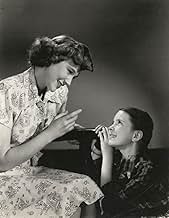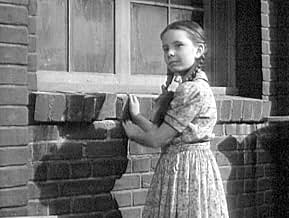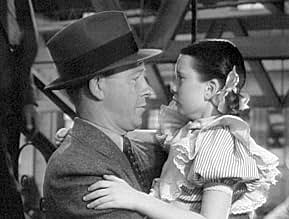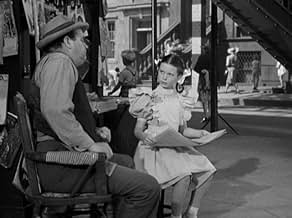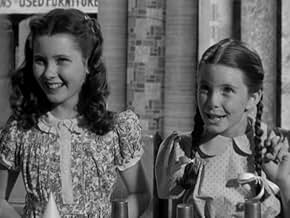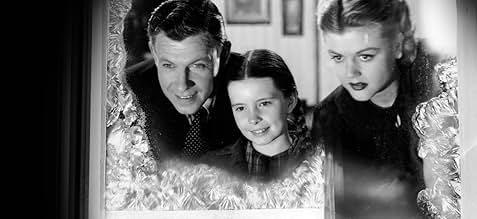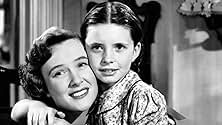Füge eine Handlung in deiner Sprache hinzuWhile a man was in prison, a little girl who is very close to him was told that he was traveling the world. What will happen if she discovers the truth?While a man was in prison, a little girl who is very close to him was told that he was traveling the world. What will happen if she discovers the truth?While a man was in prison, a little girl who is very close to him was told that he was traveling the world. What will happen if she discovers the truth?
Richard Tyler
- Jimmy Madson
- (as Dickie Tyler)
John Albright
- Celebration Guest
- (Nicht genannt)
Max Barwyn
- Man on Street
- (Nicht genannt)
Eumenio Blanco
- Celebration Guest
- (Nicht genannt)
Chet Brandenburg
- Police Officer at Celebration
- (Nicht genannt)
George Bruggeman
- Celebration Guest
- (Nicht genannt)
Empfohlene Bewertungen
7jhkp
Warm film with the usual top MGM production values, strong cast.
When I finally saw this film I was surprised it was described as a "bomb" by Leonard Maltin. While it's not the greatest movie ever made, it's hardly a bomb, despite the problematic production history. Because retakes took so long, Margaret O'Brien is noticeably taller and older in some scenes than in others. The character's belief in fairy tales strains credulity in the scenes where little Margaret seems to be aging rapidly.
One could argue, as well, that, despite the hardships supposedly being endured by the characters in their poor New York neighborhood, at the height of the Great Depression, they seem reasonably well fed, dressed, and housed. The apartment where Flavia (O'Brien) lives is quite large, for example.
But there are some very true things in the film, the experience of being an only child, living among adults; the realities of readjustment for an ex-con (George Murphy). Many of the realities are not in the scenes or the lines, but in Margaret's and George Murphy's faces.
The cast is great and there's a nice Christmas atmosphere in the scenes that wrap up the story.
When I finally saw this film I was surprised it was described as a "bomb" by Leonard Maltin. While it's not the greatest movie ever made, it's hardly a bomb, despite the problematic production history. Because retakes took so long, Margaret O'Brien is noticeably taller and older in some scenes than in others. The character's belief in fairy tales strains credulity in the scenes where little Margaret seems to be aging rapidly.
One could argue, as well, that, despite the hardships supposedly being endured by the characters in their poor New York neighborhood, at the height of the Great Depression, they seem reasonably well fed, dressed, and housed. The apartment where Flavia (O'Brien) lives is quite large, for example.
But there are some very true things in the film, the experience of being an only child, living among adults; the realities of readjustment for an ex-con (George Murphy). Many of the realities are not in the scenes or the lines, but in Margaret's and George Murphy's faces.
The cast is great and there's a nice Christmas atmosphere in the scenes that wrap up the story.
One user comment contains an error that should be rectified. The character of Steve, played by George Murphy, is not the child's (Flavia's) father. His original relationship to the family is unclear, but he's a potential uncle, and the point is that he is a big favorite of this little girl's. Flavia's father appears early in the film, very briefly. He appears to be a music teacher. Steve is unmarried, and one of the major themes in the movie concerns whether he and Susan (the unbelievably pretty Angela Landsbury) can build up a life together after he has been released from prison.
Maybe my tolerance for smaltz is higher, I don't find the film to be that cheezy or obvious. It's hard for children to know the difference between fact and fiction, how fiction is often truer in spirit than facts, and how stories help get us through rotten times. (If you notice, Flavia's mother uses stories mostly to console the child).
Christmas stories are supposed to be schamltzy, aren't they?
Maybe my tolerance for smaltz is higher, I don't find the film to be that cheezy or obvious. It's hard for children to know the difference between fact and fiction, how fiction is often truer in spirit than facts, and how stories help get us through rotten times. (If you notice, Flavia's mother uses stories mostly to console the child).
Christmas stories are supposed to be schamltzy, aren't they?
Tenth Avenue Angel might remind you somewhat of A Tree Grows In Brooklyn - the apartment seemed similar, the mother becomes pregnant, there's a family member who has to overcome a stigma,an economically challenged household, the coming-of-age of the daughter. However, all of it is without emotional resonance, to say the least. And although I'm usually not fans of these kinds of films I DID love "A Tree Grows in Brooklyn".
So what's missing? Despite the evocative lower Manhattan sets, the genuinely warm and believable performance of Phyllis Thaxter as the mother, Rhys Williams as a blind newspaper vendor and (occasionally) Margaret O'Brien (when she's ruling the roost of her neighborhood in a precociously cynical way; not when she's required to do The Crying and saying lines like "How do cows know it's Christmas?") the movie doesn't work for me at all. This is one of those "we-don't-know-what-to-do-with-her" parts for the supremely talented Angela Lansbury, here completely wasted as O'Brien's young aunt, in love with the equally miscast George Murphy (he does his best, though the script just sinks him). Rhys Wiliiams was so much better served in How Green Was My Valley in much the same type of character (albeit more pugilistic).
Margaret gives a patriotic speech at a Fourth of July block party which it's safe to surmise (since the film was made in 1946, only one year after FDR died though released in 1948) is a double tribute to him and his principles (they even show his picture); convenient dovetailing as the story takes place in Depression era 1936.
Apparently mice are so common in their household that the one O'Brien sees doesn't phase the family one bit; nobody bats an eyelash. Also, when pregnant women fall down stairs, they are not taken to the hospital.Also, bovine miracles will astound you. I was underwhelmed throughout.
I'd say it's a take it or leave it proposition, probably a 4.5, but I'll be kind given the season and round up to five.
So what's missing? Despite the evocative lower Manhattan sets, the genuinely warm and believable performance of Phyllis Thaxter as the mother, Rhys Williams as a blind newspaper vendor and (occasionally) Margaret O'Brien (when she's ruling the roost of her neighborhood in a precociously cynical way; not when she's required to do The Crying and saying lines like "How do cows know it's Christmas?") the movie doesn't work for me at all. This is one of those "we-don't-know-what-to-do-with-her" parts for the supremely talented Angela Lansbury, here completely wasted as O'Brien's young aunt, in love with the equally miscast George Murphy (he does his best, though the script just sinks him). Rhys Wiliiams was so much better served in How Green Was My Valley in much the same type of character (albeit more pugilistic).
Margaret gives a patriotic speech at a Fourth of July block party which it's safe to surmise (since the film was made in 1946, only one year after FDR died though released in 1948) is a double tribute to him and his principles (they even show his picture); convenient dovetailing as the story takes place in Depression era 1936.
Apparently mice are so common in their household that the one O'Brien sees doesn't phase the family one bit; nobody bats an eyelash. Also, when pregnant women fall down stairs, they are not taken to the hospital.Also, bovine miracles will astound you. I was underwhelmed throughout.
I'd say it's a take it or leave it proposition, probably a 4.5, but I'll be kind given the season and round up to five.
I saw this movie as a child, and of course I have a different perspective than I would have had as an adult. I never forgot that she doubted God; because her Mom had told her about untrue superstitions.
OK, so it seems a bit cheesy and sentimental and all. So what. I like every movie that Margaret O'Brien is in. The viewer can see things through a little girl's eyes in New York during the Depression. She roller skates around and thinks that Tenth Street is her territory.
She idolizes the adults in her life, including her mother and aunt, and a potential fiancée of her aunt, Steve. As the movie progresses, Flavia discovers more and more little white lies that those she loves have told her. She has to deal with it.
I loved to see her interaction with her mother, played so well by Phyllis Thaxter, and all of the adults, including the blind man who sells papers and magazines. Of course Margaret O'Brien had to do at least one crying scene, one of her many specialties. She also can deliver a monologue with the best of them, in this case reciting a patriotic speech. She is just mesmerizing in that scene.
I teared up a few times and felt good when the movie was over. I don't see this movie as dated. Children have to grow up and move on from fantasies and stories that they have grown up with. That is timeless. I also appreciated the underlying moral to the story of getting answers to prayer and the importance of closeness in families.
She idolizes the adults in her life, including her mother and aunt, and a potential fiancée of her aunt, Steve. As the movie progresses, Flavia discovers more and more little white lies that those she loves have told her. She has to deal with it.
I loved to see her interaction with her mother, played so well by Phyllis Thaxter, and all of the adults, including the blind man who sells papers and magazines. Of course Margaret O'Brien had to do at least one crying scene, one of her many specialties. She also can deliver a monologue with the best of them, in this case reciting a patriotic speech. She is just mesmerizing in that scene.
I teared up a few times and felt good when the movie was over. I don't see this movie as dated. Children have to grow up and move on from fantasies and stories that they have grown up with. That is timeless. I also appreciated the underlying moral to the story of getting answers to prayer and the importance of closeness in families.
Wusstest du schon
- WissenswertesFilmed between March 11 and May 15, 1946, with re-takes shot in April 1947, the movie was held back until its nationwide release on February 20, 1948.
- PatzerFlavia brings home a loaf of "dark bread, your daddy's favorite", as her mother says. One look at the wrapper clearly reveals it to be Wonder Bread, which at the time made only white bread.
- Zitate
Narrator-Visitor to Tenth Avenue: Hey, you! Will you keep out of the street!
Flavia Mills: Why? It's my street!
- VerbindungenReferences Castle on the Hudson (1940)
Top-Auswahl
Melde dich zum Bewerten an und greife auf die Watchlist für personalisierte Empfehlungen zu.
- How long is Tenth Avenue Angel?Powered by Alexa
Details
- Erscheinungsdatum
- Herkunftsland
- Sprache
- Auch bekannt als
- Ангел с Десятой авеню
- Drehorte
- New York City, New York, USA(various establishing shots)
- Produktionsfirma
- Weitere beteiligte Unternehmen bei IMDbPro anzeigen
Box Office
- Budget
- 1.791.000 $ (geschätzt)
- Laufzeit
- 1 Std. 14 Min.(74 min)
- Farbe
- Seitenverhältnis
- 1.37 : 1
Zu dieser Seite beitragen
Bearbeitung vorschlagen oder fehlenden Inhalt hinzufügen


